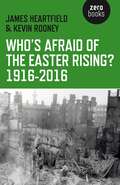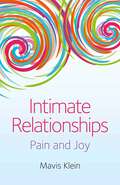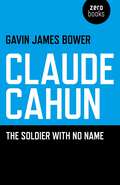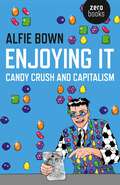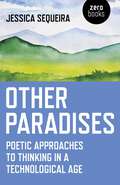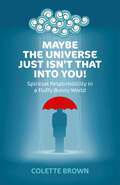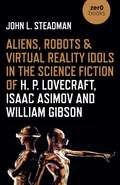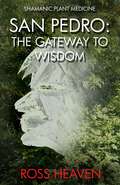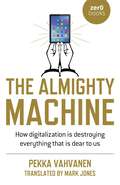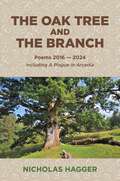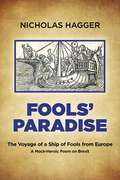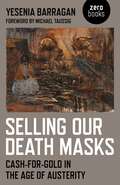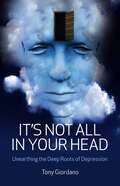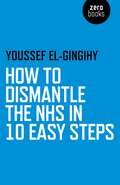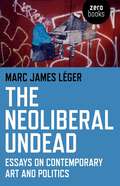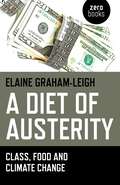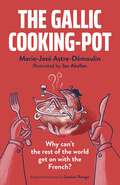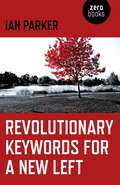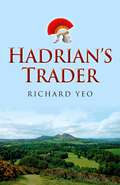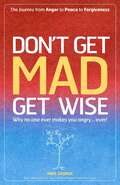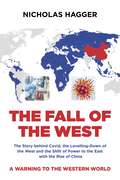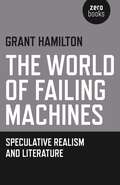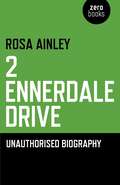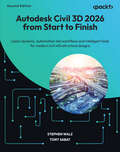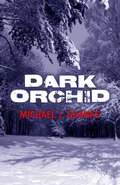- Table View
- List View
Who's Afraid of the Easter Rising? 1916-2016
by James Heartfield Kevin RooneyOne hundred years ago, Easter 1916, Irish revolutionaries rose against the British Empire proclaiming a Republic from the steps of the General Post Office in Dublin. The men and women of the Easter Rising were defeated by the overwhelming force of the British Army, in five days of intense fighting. Their leaders were executed. But the Easter Rising lit a fire that ended with the whole country turning against Westminster&’s rule, and founding a nation. But today, the heirs to the Irish state are embarrassed about 1916. They are ashamed that their state owes its origins to a revolution. Along with academics and other commentators in the press and on television they dismiss the Rising as the work of violent fanatics, and the defeat of constitutional politics. Who&’s Afraid of the Easter Rising? explains why today&’s Dublin elite are recoiling from the origins of their state in a popular struggle. Where the critics paint the Rising as an armed conspiracy, we explain that it was in fact a revolt against war; not a militaristic upsurge, but the first challenge to the awful slaughter of the First World War. The Statesmen of Europe sacrificed millions upon the altar of war. Their recruiting sergeants in Ireland, Edward Carson and John Redmond sent 200,000 Irishmen into the slaughter and nearly 50,000 were killed. The Easter Rising drew a halt to British recruitment, and the blow to the Empire was the first crack in a growing revolt against the war, followed by the Russian Revolution in 1917, and the German revolution the following year – which ended the conflict. The Easter Rising was an inspiration to those who were challenging the Empires of Europe, from India to Vietnam, from New Zealand to Moscow; it was an inspiration to British activists like John Maclean and Sylvia Pankhurst; and it was an inspiration to the Irish men and women who rose up against British rule to free their nation.
Intimate Relationships: Pain and Joy
by Mavis KleinIf human life, as the author argues, is a constant and desperate bid to compensate for our mortality, then the desire to love and to be loved is our greatest imagined panacea against the fact of our death. In modern Western society our problems have changed: now, with our stomachs full, our need to feel we are struggling to survive has become increasingly focussed on a growing dissatisfaction and insecurity in our personal relationships. Drawing on her 35 years' experience as an individual and group psychotherapist, Mavis Klein here elaborates her original theory of five basic personality types, ten compound types, and fifteen ways in which the basic types interact with each other in our relationships to others. She clearly elucidates the behaviours that disguise our often self-induced pains, and how these pains can be transmuted into our greatest talents and joy. This book addresses the reality of the world we are so often unwilling to accept: the irrational and violent world of shame, doubt, guilt, fear, love and hate.
Claude Cahun: The Soldier with No Name
by Gavin James BowerClaude Cahun is the most important artist you've never heard of - until now. Writer, photographer, lesbian; revolutionary activist, surrealist, resistance fighter - Cahun witnessed the birth of the Paris avant-garde, lived through two World Wars and, as "Der Soldat ohne Namen", risked death by inciting mutiny on Nazi-occupied Jersey. And yet, she's until recently been merely a peripheral figure in these world-shaping events, relegated by academics to the footnotes in the history of art, sexual politics and revolutionary movements of the last century. Now more so than ever, Cahun demands a significant presence in the history of surrealism and the avant-garde - even, in the literary canon of early twentieth-century literature. Indeed her one major book, Disavowals, is a masterpiece of anti-memoir writing. Much has been made of her as a photographer, but Claude Cahun "the writer" was one of the most radical and prescient leftists of the century. At a time when her star is rising like never before Claude Cahun: The Soldier With No Name represents the first explicit attempt in English to posit Cahun as an important figure in her own right, and to popularise one of the most prescient and influential artists of her generation.
Enjoying It: Candy Crush and Capitalism
by Alfie BownUsing a range of &‘case studies&’ from Critical Theory to Candy Crush, &‘Gangnam Style&’ to Game of Thrones and Football Manager to Hieronymus Bosch, this book argues that we need to rethink our enjoyment. Inspired by psychoanalysis, the book offers a new way of thinking about how we talk about what we enjoy and how we enjoy what we talk about.
Other Paradises: Poetic Approaches to Thinking in a Technological Age
by Jessica SequeiraWhy do people choose to play with ideas considered antiquated? Why do they elect to act in non-productive ways? Perhaps the question can be asked in reverse: What comes to mind when we think of technology? That which is practical, efficient, invisible, fast, optimistic, constantly updated. So how can one explain the search for the opposite, that which is useless, inefficient, physically present, slow, dystopian, obsolete and governed by chance? The matter of what motivates the search for &‘antiquated&’ forms strikes deep into the heart of value. Are people simply following trends? Are they idiots? Are they sentimental? Are they artists? Are they interested in kitsch? Are they uninformed? Are they poets? Other Paradises is a collection of essays exploring imaginative responses to science and technology, and is about people who choose to build &‘other paradises&’, fully conscious of the alternative they offer to the dominant paradigm of technological progress.
Maybe the Universe Just Isn't That Into You!: Spiritual Responsibility in a Fluffy Bunny World
by Colette BrownYou have read the little books of affirmations, done the daily angel/oracle/astrological inspiration thing? Fine...me too! But it has all gone too far. We now have a great swathe of spiritual people who are giving up personal responsibilty for their actions and claiming that simple bad decisions are the work of Spirit/God/Universe. It has to stop. Everything is a "lesson" or a "gift". So here is the book that debunks the usual suspects. It shows up what is simply a lack of strength and character when things go so wrong that "Spirit told me to do it" is simply an excuse for someone looking to avoid facing the truth in their own life. Yes...it's an angry and non-subtle book. It is needed in an ocean of fluffy-bunny rainbows. It is time for the pendulum to swing the other way.
Aliens, Robots & Virtual Reality Idols in the Science Fiction of H. P. Lovecraft, Isaac Asimov and William Gibson
by John L. Steadman&“Steadman&’s comprehensive guide wrestles with the concept of the &‘alien&’, applying cutting edge theoretical and philosophical ideas to the work of some of the greats of Science Fiction to arrive at a set of exciting new discoveries about what the genre says it means to be &‘human&’. Reading Aliens, Robots and Virtual Reality Idols guarantees that you will never look at the writing of Lovecraft, Asimov or Gibson in the same way again.&” --Dr David Simmons, Senior Lecturer in English and Screen Studies, University of NorthamptonH. P. Lovecraft's aliens are extra-terrestrial, terrestrial & trans-dimensional entities, totally unlike any other aliens in science fiction literature. In contrast, Isaac Asimov's and William Gibson's aliens are human created positronic robots and virtual reality constructs, or 'idols'. Lovecraft's great theme is alien indifferentism, tinged with a malevolence that escalates into an existential, apocalyptic threat against humankind, while for Asimov and Gibson, alien inclusionism is the norm. The robots and the VR idols integrate into society and their influence appears to be beneficial. But this is only on the surface. In this book, John L. Steadman demonstrates that there is ultimately little difference between alien indifferentism and alien inclusionism in the fictional works of these three great writers. For in fact, the robots and the VR idols evolve into monsters whose actions bring about outcomes which are every bit as terrifying as anything in Lovecraft's work. Humans tend to be isolates ('alien'-ated). The reader is invited to question this, and to consider the possibility that an alien perspective, or platform, might, perhaps, be crucial if we intend on seeing ourselves clearly and understanding exactly what it means to be human.
Shamanic Plant Medicine - San Pedro: The Gateway to Wisdom
by Ross HeavenThe Shamanic Plant Medicine series acts as an introduction to specific teacher plants used by shamans in a variety of cultures to facilitate spirit communion, healing, divination and personal discovery, and which are increasingly known, used and respected in Western society by modern shamans as a means of connecting to spirit. Named after Saint Peter, the gatekeeper to Heaven, San Pedro is used by the shamans of the Andes in ways similar to ayahuasca and for similar reasons and effects. Its close relative, peyote, is employed by the shamans of Mexico and its modern chemical equivalent, Ecstasy, has become a popular rave culture means to trance and bliss states. Awareness of San Pedro is spreading rapidly in the West and the plant is likely to become more utilised than ayahuasca in the near future.
The Almighty Machine: How Digitalization Is Destroying Everything That Is Dear to Us
by Pekka VahvanenThe hymn of Digitalization is nothing new: We must encourage the creation of new apps. We must develop AI in order to prevail among international competition. Technology's advance will halt climate change and let robots do the dumb stuff for us. Our faith in technology is powerful because it has saved us in the past. The Almighty Machine shows us technology&’s flip side. The things that once powered us toward a brighter tomorrow are already undermining our quality of life. The data stream has shattered our concentration, human relationships have been reduced to a menu of emojis, constant surveillance has nullified much of our privacy, and the development of AI could be the beginning of the end for us. We are becoming the casualties of our own success. Pekka Vahvanen's bristling and timely critique, deftly translated by Mark Jones, throws doubt on the necessity of technological development in a world saturated in tech. The Almighty Machine presents an important question: Does progress no longer make us happier?
The Oak Tree and the Branch: Poems 2016-2024
by Nicholas HaggerNicholas Hagger&’s Collected Poems contained 30 volumes of his poems, and Life Cycle and Other New Poems contained volumes 31-34. Together they reflect his quest along the Mystic Way, and the vision of unity and harmony to which it led. The Oak Tree and the Branch contains volumes 35-41 and continues his presentation of apparent conflicts (Brexit, coronavirus, war and extreme suffering) and the underlying unity of the universe within his Arcadia. The Oak Tree and the Branch sees the UK&’s departure from Europe as a lopped branch from the Tree of Tradition of European civilisation. The Tapestry dwells on his rootedness in the past, especially in the Tudor time. A Plague in Arcadia: Oneness with Nature and the Universe presents a host of Nature poems in his local Fairmead&’s Arcadian paradise during the spread of coronavirus, the Covid plague. An Oval Cloud presents a sequence of encounters with an oval cloud seen behind his closed eyes, which he tries to understand. Court Poems: More Royal Classical Odes includes Royal events: a wedding, two funerals and a coronation, and another lopped branch. In Arcady: A Gong and Padded Stick surveys his Providential life. And the harrowing Agony in Arcady: Stroke wrings from him the whole range of emotions as he comes to terms with his daughter&’s severe stroke (another lopped branch) and heroic endurance. Hagger&’s mystical vision of the unity of Nature, the universe and humankind shines through all these new poems. Hagger derives his inspiration from the 16th- and 17th-century Metaphysical poets and seeks to unite the later Augustan and Romantic traditions. These poems reconcile the soul&’s harmony with the universe and the conflicts in public life, and add significantly to the themes of Collected Poems, Classical Odes, Life Cycle and Hagger&’s two poetic epics, Overlord and Armageddon, all published by O-Books. They carry forward his Universalist approach to poetry which unveils an ordered universe behind the apparent chaos of world events
Fools' Paradise: The Voyage of a Ship of Fools From Europe, A Mock-Heroic Poem on Brexit
by Nicholas HaggerIn Fools' Paradise, a mock-heroic poem on Brexit which complements his masque King Charles the Wise, Nicholas Hagger presents the most important British event since the Second World War: the Brexiteers' struggle to wrest control of the UK's laws, borders, money and trade from the EU and turn the UK into a more prosperous paradise.In 16 cantos and an epilogue of heroic couplets with an epic tone, he narrates the 2018 Chequers compromise and its aftermath: the EU's opposition, lack of internal support, looming &‘no deal' and requests for extensions that keep the UK in the EU. He shows the UK Ship of State as manned by a squabbling crew sailing for an illusory paradise and too riven by division to reach agreement. The dream all were promised seems undeliverable. In the tradition of the social satire of Dryden and Pope, the elevated style is undermined by a recurring image of the Ship of Fools in Sebastian Brant's 1494 Swiss poem Ship of Fools (Das Narrenschiff), which makes a chaotic voyage from Europe to an illusory paradise across the waves. It becomes apparent that all on the UK Ship of State are to some extent living in a fools' paradise. Focusing on the historic decision to leave Europe that if carried through would have immense repercussions for coming generations, Nicholas Hagger presents the warring factions on the UK Ship of State and in true Universalist manner foresees a resolution of the conflict in the reconciliation of a coming united world. This is an astonishing poem that approaches the most important national event of our time in the spirit of Tennyson and gets to the heart of the UK's national predicament.
Selling Our Death Masks: Cash-For-Gold in the Age of Austerity
by Yesenia BarraganA radical historical ethnography on the meaning of a fundamentally new physical landscape of our age of austerity: cash-for-gold shops that numerically exploded in the wake of the worst economic crisis of our times.
It's Not All In Your Head: Unearthing the Deep Roots of Depression
by Tony GiordanoThe story of one man's search for the roots of a puzzling depression that struck suddenly in midlife reaches back decades to a dysfunctional alcholic household. It is not unlike the story of millions of sufferers. This humanistic portrayal dispels myths about depression to eradicate its stigma.
How to Dismantle the NHS in 10 Easy Steps
by Youssef El-GingihyDr Youssef El-Gingihy – a GP – tells the story of how the NHS has been gradually converted into a market-based healthcare system over the past 25 years. This process is accelerating under the Coalition government and the very existence of a National Health Service is in danger. He fears that there will not be an NHS as our generation grows old and certainly not for our children. Yet the British public remains largely unawares of this and the media, with few exceptions, have failed in their duty to inform them. The NHS is being broken up into an universal insurance system based on the American model. This book matters to all who use the NHS or are concerned by the privatisation of public services and the dismantling of equitable healthcare and welfare. If you want to understand the real story behind the headlines and find out how you can preserve the NHS for the future then this book is essential reading.
Neoliberal Undead: Essays on Contemporary Art and Politics
by Marc James LégerThe Neoliberal Undead describes the frightening world of class restoration, neoliberal austerity, ecological meltdown, and neo-imperialism a disaster capitalism that breeds mutant ideological justifications for itself and the inevitability of disorder, poverty and suffering. What role does culture play in this world of markets and how do new contestatory forms enable a leftist solidarity that can move cultural radicalism beyond the postmodern obsession with new subjectivities? Rather than become the symptoms of democratic materialism, signing up for endless culture wars, The Neoliberal Undead argues for a rethinking of radical cultural leftism against the terms of the dominant global situation. The relentless reduction of art criticism and art production under capitalist relations requires that the living separate themselves from the abstractions of globalization and reconnect with revolutionary theory.
A Diet of Austerity: Class, Food and Climate Change
by Elaine Graham-LeighReceived wisdom is increasingly that we all have to eat less to save the planet, but received wisdom is wrong. A Diet of Austerity argues that, just as the poor are blamed for the economic crisis, Malthusian conceptions about food and ecology are being used to hold the working class responsible for climate change and global hunger. Challenging existing dogmas about overconsumption and personal responsibility, it shows that what we need to stop climate change is system change.
The Gallic Cooking-Pot: Why Can't The Rest Of The World Get On With The French?
by Marie-José Astre-DémoulinHave you ever imagined that fabulous qualities could be hidden behind the moody exterior of the French? No? Then you have not discovered their full beauty. It will be revealed to you in this highly entertaining yet informative book. The author, a French national, gives you the vital tools and tips on how to interact with her compatriots, should some situations turn a little... tense - as they well might. The only risk is that, after reading this book, you will not only appreciate culture, food, wines, and landscapes of France, but you will never again mutter shame about the French. Instead, you will be proclaiming: Vive la Différence!
Revolutionary Keywords for a New Left
by Ian ParkerRevolutionary Keywords for a New Left comprises short essays on fifty revolutionary keywords, each word being put to work on a contemporary political issue. With keywords ranging from academicisation to neoliberalism, from postcolonial to Zionism and with subjects including, Badiou, North Korea, sexual violence and Žižek, the book concludes with an essay mapping the development of progressive keywords before our century of revolution, which began in 1917, keywords that emerged in the fifty years of struggle between 1917 and 1967, and revolutionary keywords for the new left today.
Hadrian's Trader
by Richard YeoLucius is a young Centurion in the time of Hadrian, serving at Trimontium, modern-day Melrose in southern Scotland. Trista is a Roman patrician girl, living in Gaul. She is orphaned and becomes a vagrant when her parents are killed by traitors plotting to overthrow the emperor. Following the death of his wife, Lucius becomes an imperial agent, operating beyond the borders of the Empire as a trader, seeking signs of invasion. He meets Trista who is under threat of assassination. The story follows their flight across Gaul, pursued by evil forces, to the German forests in a race to avert invasion and the death of the emperor.
Don't Get MAD Get Wise: Why No One Ever Makes You Angry, Ever!
by Mike GeorgeAnalyzes the illusions we have created for ourselves that justify our anger. We can draw on our own inner resources to heal its scars and focus on forgiveness for ourselves and others.
The Fall of the West: The Story behind Covid, the Levelling-Down of the West and the Shift of Power to the East with the Rise of China
by Nicholas HaggerIn The Syndicate (2004) Nicholas Hagger described how in the 20th century a Syndicate of élitist mega-rich families levelled down the leading Western countries by promoting revolutions, wars and independence movements against their empires, and planned a New World Order and world government that would control the earth's resources for their own benefit. In The Secret History of the West (2005) he traced the Syndicate's roots back to secret Freemasonic organisations and revolutions that undermined the West from the Renaissance to the early 20th century. In The Fall of the West (2022), the third book in his trilogy on the West, Hagger updates the story to include the pandemic and describes how Syndicate-driven 21st-century events from the War on Terror to Covid have brought the Western financial system to the brink of collapse and shifted power from the West to the East, and China. In this first impartial attempt to assemble all the evidence to date for the origin of Covid (like fitting together available pieces of a jigsaw to reveal the main picture) Hagger, the first to discover the Cultural Revolution in China in March 1966, finds that the three main features of Covid-19 were man-made by American NIAID-funded medics in 2002 and patented 73 times since 2008, and seem to have been surreptitiously used as a bio-weapon in a Syndicate plan to limit the rise of China and its expanding trade. A dangerous new Biological Age has been born, and the West faces being levelled down and a sudden fall. Hagger sees the post-Covid West's dream of creating a good New World Order - a vaccine-protected democratic, presidential, part-federal world government and World State with sufficient authority to abolish war and solve the world's post-Covid problems - as being challenged by the self-interested Syndicate's levelling-down; and to survive, it first has to go along with the Syndicate's plan for West and East to draw together into an authoritarian world government involving China, and democratise later. This is a thought-provoking work with a prophetic vision of the future.
The World of Failing Machines: Speculative Realism and Literature
by Grant HamiltonThe World of Failing Machines offers the first full-length discussion of the relationship between speculative realism and literary criticism. In identifying some of the most significant coordinates of speculative-realist thought, this book asks what the implications might be for the study of literature. It is argued that the first casualty might well be the form of the traditional essay.
2 Ennerdale Drive: An Unauthorised Biography
by Rosa Ainley2 Ennerdale Drive is a memoir of a house and the family that lived there; a work of text and image encompassing architecture, social and personal history, town planning, photography and representation, carving a space within and between new forms of memoir, cultural studies and creative non-fiction.
Autodesk Civil 3D 2026 from Start to Finish: Learn dynamic, automation-led workflows and intelligent tools for modern civil infrastructure designs
by Stephen Walz Tony SabatDesign civil infrastructure faster and boost collaboration with Autodesk Civil 3D 2026's new autonomous workflows that optimize delivery as an individual, team, or organization. Bonus 1: Access chapter-by-chapter video tutorials on YouTube—follow along visually with every topic covered in the book. Bonus 2: Download exercise files to practice each concept with real-world projects and reinforce your hands-on learning.Key FeaturesMaster the latest features and interface updates in Civil 3D 2026 to streamline modern infrastructure workflowsScale your workflows to larger teams and bigger projects while maximizing efficiencyLearn how to work with enhanced modeling, corridor targeting, and pressure toolsPurchase of the print or Kindle book includes a free PDF eBookBook DescriptionWith engineering projects getting bigger, deadlines getting tighter, and greater demands for precision, you need tools that do more and work smarter. Autodesk Civil 3D 2026 rises to the challenge, delivering powerful new capabilities for high-precision design modeling and streamlined collaboration. In this second edition, Stephen Walz and Tony Sabat, leaders in digital design and innovation in civil infrastructure, walk you through Civil 3D’s cutting-edge features, such as pressure layout improvements, dynamic corridor targeting, and performance enhancements for surface modeling and grading. It’s not just about learning new features; you’ll be able to integrate these new toolsets into real-world workflows, develop standards, and collaborate effectively within distributed teams. From surface development and intelligent utility design to smart document creation, this book explores practical and automated applications of tools and modeling techniques that you’ll use every day. Whether you work independently or are part of a large design team, you’ll walk away knowing how to configure, manage, and deliver projects with Civil 3D 2026 while improving your entire project pipeline.What you will learnCreate and manage surfaces, alignments, and profilesImport and organize survey data for accurate base mapsDesign roadways, parcels, and utility networksStreamline design with Model Viewer, Dynamo, and Targeted Data ReferencesEliminate redundancy using intelligent, dynamic Civil 3D objectsOptimize 3D modeling to improve design decisions and outcomesAutomate sheet creation for profiles and sectionsModel advanced corridor features such as intersections and railsWho this book is forThis book is for civil engineers, environmental engineers, civil designers, civil technicians, and professionals working with Civil 3D or InfraWorks who want to maximize Civil 3D’s potential in their everyday design work. To get the most out of this guide, you'll need a basic understanding of civil engineering and surveying workflows, along with foundational knowledge of Autodesk AutoCAD. General familiarity with surveying practices, civil/environmental engineering practices, and AutoCAD drafting is assumed.
Dark Orchid
by Michael J. ShanksEveryone wants to do the right thing. Sometimes doing the right thing can lead you down a path from which there is no return. Follow Galston McGee and James Bisset as they journey through 1970s Glasgow, white-collar fraud and organised crime. As their lives intersect, the consequences are deadly and catastrophic. Dark Orchid is a fast-paced story of love, greed, resurrection and revenge.
